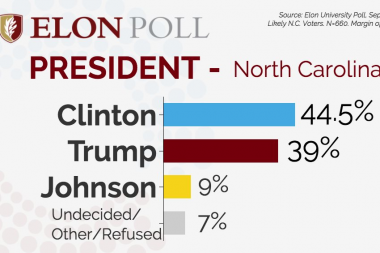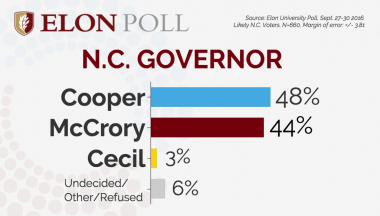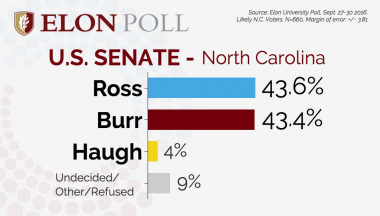The survey of likely N.C. voters is the second this fall, and relies upon Elon students as live interviewers of hundreds of voters.
FULL REPORT with METHODOLOGY & CROSS TABS
Democrat Hillary Clinton has turned a virtual tie two weeks ago into a nearly 6-point lead over her Republican rival Donald Trump in the battleground state of North Carolina, according to the latest findings by the Elon University Poll. The jump in support for Clinton comes with nearly two-thirds of likely voters saying she won the Sept. 26 presidential debate, and nearly half saying they now have less confidence in Trump after his debate performance.



“That Richard Burr has not fallen in poll numbers like fellow Republicans McCrory and Trump is a positive sign for the Burr campaign’s prospects as a whole,” Husser said.
CLINTON VS. TRUMP
Clinton’s increase in support comes after she trailed Trump by close to 2 points during the first Elon Poll of the fall, released Sept. 20. Clinton is now the preference of 44.5 percent of voters while 39 percent plan to vote for Trump. Libertarian Gary Johnson has seen an increase in support, with 9 percent planning to vote for him in November compared to 6 percent of those polled earlier last month.
Clinton has retained her support among black voters, with 98 percent planning to vote for her, while benefitting by a widening gender gap in the race. Among those planning to head to the polls in North Carolina next month, 61 percent of female voters plan to voter for Clinton while 56 percent of male voters plan to pick Trump. Two weeks ago, she held a 53-47 advantage over Trump among likely female voters.
Looking at how the two performed in the Sept. 26 debate, 64 percent of those likely voters who watched the debate picked Clinton as the winner. Democrats overwhelmingly picked Clinton as the winner, and even 30 percent of Republicans said she won the debate. Among independent voters, 63 percent said Clinton won the debate. Among likely voters who watched, 18 percent said Trump was the winner of the debate.
N.C. GOVERNOR’S RACE
The N.C. governor’s race has also seen a change in leads. Cooper is now the choice of 48 percent of likely N.C. voters while 44 percent plan to pick McCrory. That’s a near reversal of the 49-46 lead that McCrory held in the first Elon University Poll of the fall released two weeks ago.
Cooper’s move to the front has come as he has generated stronger support among female voters, with 59 percent now planning to vote for him next month. That compares to a 52-48 split for Cooper among female voters found during the last poll. McCrory continues to lead Cooper with male voters by the same 55-45 margin found during the earlier poll.
“Backlash over HB2 seems to have harmed Pat McCrory’s poll numbers,” Husser said. “McCrory continues to struggle with women and with African-Americans.”


